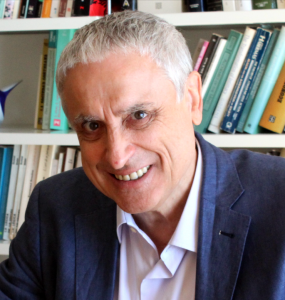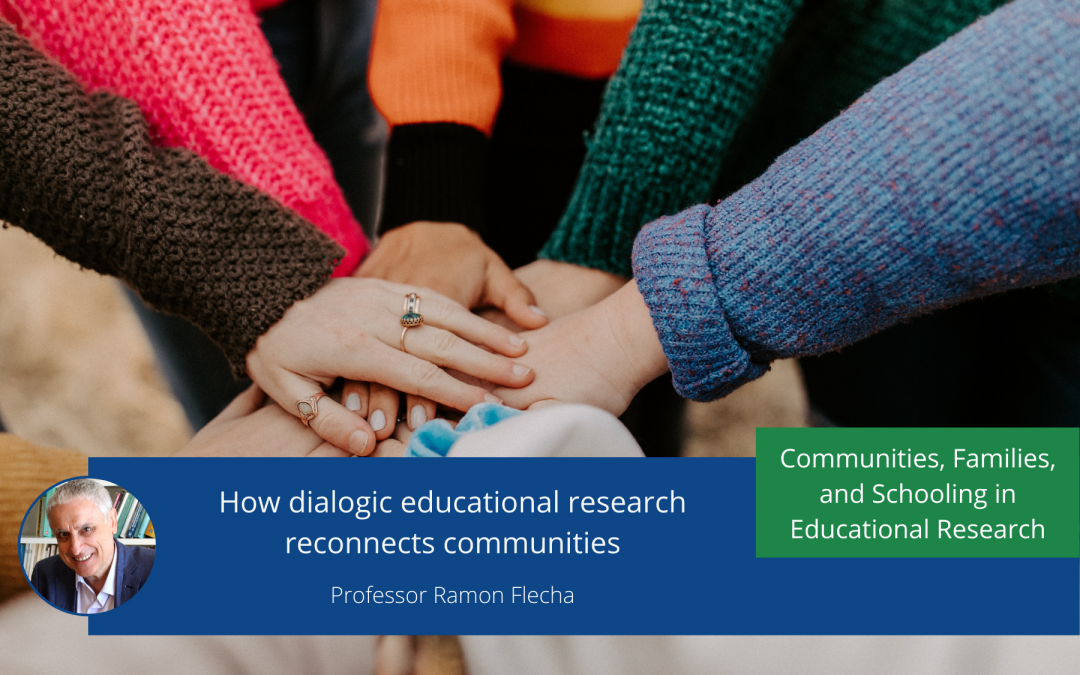At the European Conference of Educational Research in 2020, Professor Ramon Flecha presented his keynote “How dialogic educational research reconnects communities”. Here he shares his research with our readers.
My presentation was part of the panel at the European Conference of Educational Research in 2020, shared with two excellent speakers, with the outstanding coordination of Joe O’Hara. It was entitled ‘How dialogic educational research reconnects communities’, and it was organized around four sections:
- Dialogic social impact and the human right to science and education
- Dialogic Educational Research (DER) and Co-creation
- DER and educational communities
- DER and ethics.
What is a Dialogic Approach?
Language is one of the most remarkable human capacities. Through language, individuals are capable of action and, in consequence, of transforming their context in the direction they desire. Drawing on this idea, the dialogic approach refers to the fact that in our current societies, individuals turn more and more frequently to dialogue as a part of their social behavior.
In this vein, reaching understandings, making choices, solving conflicts, and transforming realities, all take increasingly place through an egalitarian dialogue. In it, arguments are valued according to their validity, and not to the position of power of the person that used them. This allows for the emergence of a violence-free and democratic context, in which new consensus can be reached and new meanings can be created.
Taking this idea to the educational field implies acknowledging that any member of the community can contribute through dialogue to the improvement of the quality of education in that context. In turn, this demands the creation of spaces of dialogue in which the diversity of voices of that particular context can be heard, including those of the most excluded. Adding “research” to this equation implies for researchers to recognize the valuable contributions participants, regardless of their background, can provide to the reality under study, by sharing their understandings based on their daily-life experiences and knowledge.
Dialogic Social Impact and the Human Right to Science and Education
Article 27 of the Universal Declaration of Human Rights says that “everyone has the right…to share scientific advances and its benefits”. This right has been neglected for a long time. For instance, in education, students, parents, and communities had been excluded from their participation in the co-creation of knowledge about education. These groups had also not received information about scientific advancements in the field. In such scenarios, it is impossible to achieve the right to education for all, which is not only the right to attend school but also to receive in it the benefits of scientific advancements in education. The dominant discourse imposed a hierarchical perspective, in which researchers created knowledge, teachers received this knowledge in their training, and students, parents, and communities were the objects of its implementation.
Dialogic Educational Research (DER) and Co-creation
Horizon Europe and other international research programmes have now incorporated a dialogic demand from citizens. Social Impact and Co-Creation are the new priorities. Citizens want to see that the public investment in research yields results leading to the improvement of society and the lives of individuals. This demand was formulated in a European Conference on “Science Against Poverty” in this way:
“if society invests € 1.000.000 in research on poverty, scientists receiving this resource have to present evidence that their research contributed more to the overcoming of poverty than if this money had been given directly to poor people”.
Even though there has been resistance from researchers in education (just as in other fields), this change has been clearly co-led by educational researchers. Some studies in education have not only generated excellent improvement of educational results but also have been successful examples to orient researchers in all sciences towards the respective social impact.
Citizens are also demanding the co-creation of knowledge in dialogue with researchers. An increasing number of researchers and research institutions want a continuous dialogue with citizens too, not only with the aim to apply that knowledge, but also to create it. This increasing dialogic research is generating more improvements in society and a growth in scientific knowledge. Dialogic educational research has also co-led this change towards more democratic, transparent, and egalitarian societies.
DER and Educational Communities
Dialogic educational research promotes dialogic educational communities. Parents and communities have a lot of experiences with schools and children. Those experiences are an excellent resource for the co-creation of scientific knowledge and also for the improvement of educational results for all children.
Some people are afraid that this dialogic transformation can decrease the original status of science for society and the original status of teachers in schools. Instead, this dialogic process recreates in current society the original sense of the schools and the educational sciences. Both the universal educational systems and the social sciences were created by democratic revolutions. The objective was citizen sovereignty – to enable citizens to decide about themselves and their societies. In order to do so, universal educational systems were created to facilitate the basic knowledge to all people, and the social sciences were created in order to allow citizens and societies to know themselves.
As Max Weber demonstrated, a process of bureaucratization moved those human creations away from the voices and the decisions of citizens. Current social sciences, including educational sciences, are now overcoming this bureaucratization and recreating their original sense.
We, educational researchers, do not need a hierarchical distance from teachers or citizens in order to have status. The reality is the other way around. When we dialogue openly with citizens, they can see directly how much knowledge we can provide them in order to improve the educational results of their students or children. Besides, we learn a lot from those dialogues. One decade ago, educational sciences (and other social sciences) were under the threat of being eliminated from the European scientific programme of research; the main argument for doing so was that citizens did not see an improvement of their lives as a result of such research. This argument was refuted by successful scientific research on education: it was demonstrated that research in education (and other social sciences) can contribute to a greater improvement of society than if the resources allocated to it had been dedicated to other areas. The status of researchers for teachers, parents, communities, and students significantly increased with these studies, as well as for policymakers and institutions.
DER and Ethics
The continuous dialogue between researchers and citizens is also a guarantee for maintaining the anti-sexist and anti-racist values of education and science. The status and prestige of educational sciences decrease when some researchers behave against those values. Furthermore, we need a continuous dialogue with citizen movements such as #metoo in order to improve the values of research and research institutions. A minority of researchers harm the prestige of our field when they engage in sexually harassing behaviour or second-order sexual harassment. In order to overcome their conduct, we need a continuous dialogue with those movements and with citizens in general.
The democratic, transparent and egalitarian transformation of research is creating the most profound and fast revolution of knowledge in all human history. We are lucky to have the opportunity to be part of this transformation. In that way, we can make possible and real the ideals that moved most of us to dedicate our professional lives to this field: the right to education for all and the creation of excellent knowledge for humanity.
Watch the Keynote
Further Reading
Max Weber – Economy and Society
Flecha, R. (2020). Contributions from Social Theory to Sustainability for All. Sustainability, 2(23), 9949.
Soler, M., & Gómez, A. (2020). A Citizen’s Claim: Science With and for Society. Qualitative Inquiry.
Gómez, A., Padrós, M., Ríos, O., Mara, L.C. & Pukepuke, T. (2019). Reaching Social Impact Through Communicative Methodology. Researching With Rather Than on Vulnerable Populations: The Roma Case. Frontiers in Education, 4(9). doi: 10.3389/feduc.2019.00009

Professor Ramon Flecha
Doctor Honoris Causa of the West University of Timişoara and Professor of Sociology at the University of Barcelona.
Ramon Flecha is Doctor Honoris Causa of the West University of Timişoara and Professor of Sociology at the University of Barcelona. The main conclusion of the first project he led from the European Union’s Framework Program (FP5), WORKALÓ, The creation of new occupational patterns for cultural minorities: The gypsy case was unanimously approved by the European Parliament giving rise to various European and Member States policies. The second project he directed (FP6), INCLUD-ED. Strategies for inclusion and social cohesion from education in Europe, was the only one from the Social Sciences and Humanities included in the list that the European Commission published with 10 successful scientific investigations. The last project he directed was IMPACT-EV: Evaluating the impact and outcomes of European SSH Research (FP7), which has developed the new criteria for selection, monitoring and evaluation of the different impacts of scientific research.
Ramon Flecha has been the Chair of the Expert Group on Evaluation Methodologies for the Interim and Ex Post Evaluations of Horizon 2020, DG Research and Innovation (European Commission), composed of 17 members of all scientific disciplines. His scientific works have been published in scientific journals such as Nature, PLOS ONE, Cambridge Journal of Education, Harvard Educational Review, Organization, Qualitative Inquiry, Current Sociology, or Journal of Mixed Methods Research. His article published in the Cambridge Journal of Education received the Best Paper Prize 2013 being, in turn, the most read article of the history of the magazine.

